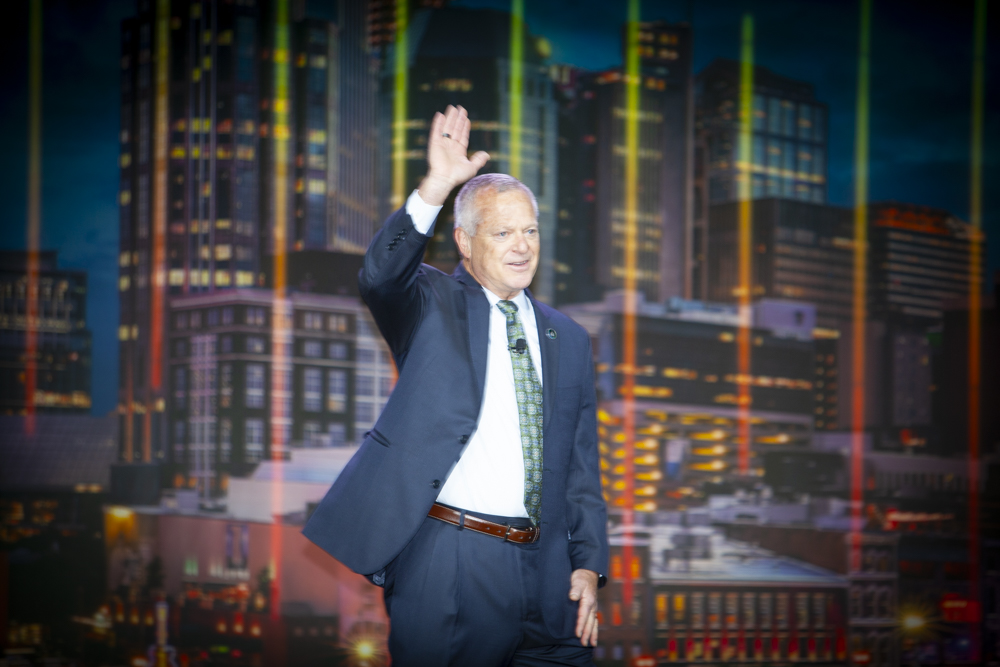Annual Conference: Joe Fifer says goodbye
Fifer’s farewell talk and an update from HFMA UK kick off the first full day of the conference
In the 11 years that Joseph J. Fifer led HFMA, he successfully guided the Association through some difficult events. The COVID-19 pandemic, the social unrest related to racial issues and enduring political divisiveness were among the challenges experienced by HFMA under his watch.
But Fifer never gave up on promoting the benefits of personal connections and self-improvement for both the Association and more importantly for the broader healthcare finance community.

In his farewell keynote speech Monday morning, his message was no different, as he broke his talk down into three themes: care, courage and community.
Careful attention
Reflecting on his 40-year relationship with HFMA, Fifer said healthcare demands care and attention beyond a finance professional’s job description, citing a quote attributed to an ancient rabbi: “It is not your duty to finish the work … but neither are you at liberty to neglect it.”
He told the audience a story about a time when he was a CFO and felt compelled to issue an ultimatum to prevent a layoff of 7% of the workforce.
“I was convinced it was the wrong thing to do,’’ Fifer said, not because layoffs are inherently wrong but for other reasons he felt strongly enough about that he would risk his job. He kept his job, and no layoffs took place.
Courage to enact change
From there, Fifer segued into a discussion about how caring enough to enact change takes courage. He cited two examples of courageous moves made by the Association, both of which have paid off, though they were “things we’ve never done before that constituted major changes in the business model of the Association.”
The first, switching to an all-inclusive business model, he said was a risky move, though HFMA execs believed feedback would be positive.
“We were confident that members would like it, but we didn’t know whether the all-inclusive model would be financially feasible for the Association,” Fifer said.

Similarly, HFMA’s decision to start offering enterprise memberships was full of uncertainty but now seems more like a lay-up given that HFMA clocked in its 100,000th member in April. That member, LaTasha Bowen, revenue cycle manager for Hughston Clinic in Columbus, Georgia, was in attendance for the keynote talk, as were colleagues, friends and family.
Secret sauce
The third “C” that Fifer addressed, community, echoed portions of the keynote talk from his successor, Ann Jordan, the previous evening.
“So much of what we do is about people,” he said. “The importance of building community is one thing that I hope will never change. We refer to it, in jest, as our ‘secret sauce.’”
Fifer said, “I believe that’s what sets us apart as an association.”
Meanwhile, the community of healthcare finance and its leading association have needs that, while not identical, have some parallels. The three areas are the need to:
- Diversify the revenue base
- Continue raising the bar on value.
- Expand the focus on cost effectiveness of health
Fifer ended his talk by unveiling “Joe’s HFMA Family Cookbook,” giving the audience a glimpse of his family life and post-retirement plans and shedding a few tears as he shared a term of endearment borrowed from his mother. “To you, my HFMA family, I love you all.”
The view from across the pond
The challenges facing hospitals in the wake of the COVID-19 pandemic are intercontinental in nature, as Lee Bond, president of HFMA UK and CFO for two hospital systems along the Humber River in northeastern England, described in remarks Monday morning.
“Productivity, efficiency and cost control of the labor market in particular are the biggest challenges we face in our [national] health system,” Bond said, noting that more than 7 million people in the United Kingdom are on the waiting list to see a clinician, while waiting times for emergency services can last 10 to 12 hours.
The country’s healthcare funding agency, NHS England, is “trying to work within a resource envelope given to them by government, which on the face of it would seem reasonable, but it doesn’t take into account the reductions we’ve seen in productivity over the last three years,” Bond said.
Although the U.K. and the U.S. are facing similar obstacles in healthcare, they diverge in the former country’s direct subsidization of care for all citizens. That brings both benefits and challenges, Bond said.
“That means there aren’t many forms to fill in, there’s no money to pay apart from a few standard costs, so it’s relatively free access for all of our citizens,” Bond said.
However, “There is always a requirement from Treasury to deliver value for money for the taxpayer. Against that backdrop, we have to leverage significant savings each year, and we also have to realize productivity improvements such that our unit costs can be seen to be falling. This is something we have really struggled with since the pandemic.
“Our challenge in the U.K. is to cut out the huge inefficiencies which have built up over the last three or four years and get back to a level of financial and operational grip that existed pre-pandemic.”
—Nick Hut, HFMA senior editor





